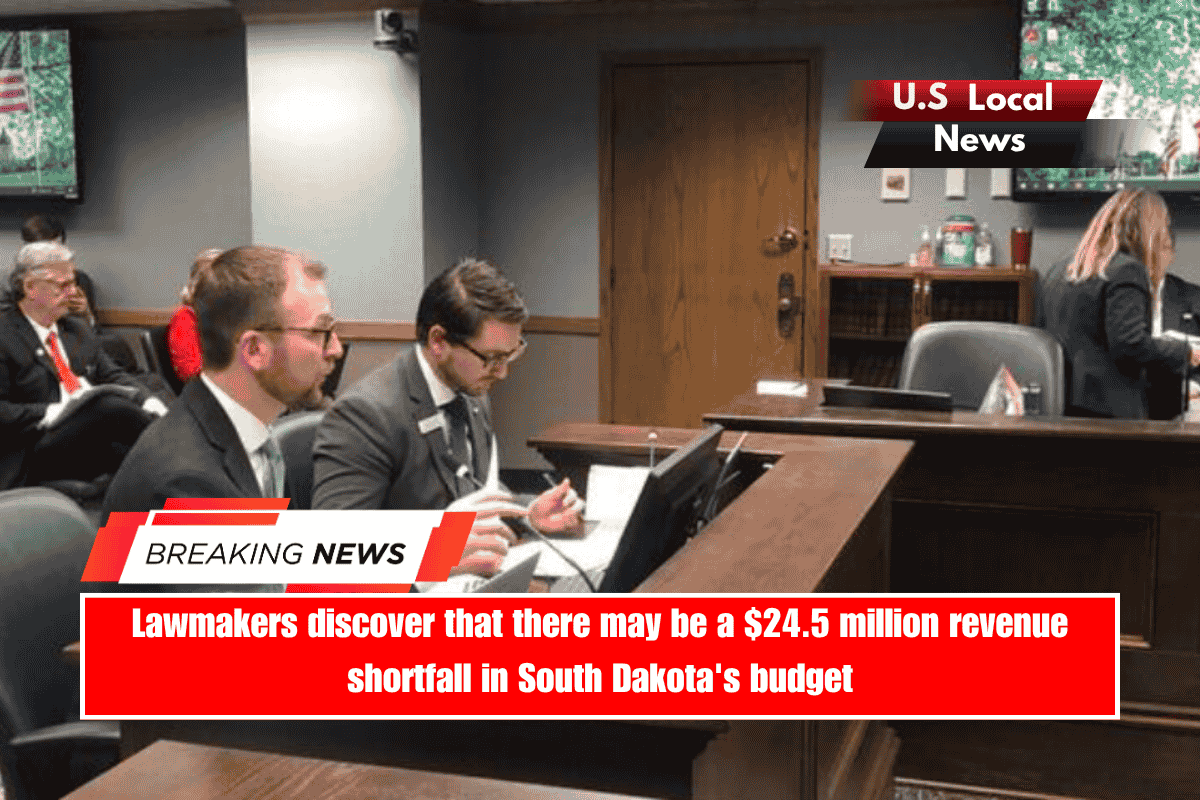Derek Johnson, a state economist with the governor’s Bureau of Finance and Management, and LRC Chief Fiscal Analyst Jeff Mehlhaff (left to right) speak to the Revenue Projection Subcommittee in Pierre during the 2023 legislative session. (Mackenzie Huber/South Dakota Searchlight)
South Dakota lawmakers should expect an even tighter state budget next session, with revenues potentially $24.5 million lower than expected, the Legislature’s budget committee learned this week.
Fiscal experts from the Legislative Research Council and the governor’s Bureau of Finance and Management briefed the committee on Wednesday in Pierre.
They said the low revenue is due in part to recent wage growth in the state failing to significantly outpace inflation, implying that South Dakotans are spending less money.
The state relies heavily on sales taxes, as well as lottery, insurance, and contractor excise taxes. Revenue is expected to increase compared to the previous fiscal year, but not to the extent that lawmakers had hoped.
The two agencies predict that the state’s general fund will fall between $18.3 million and $24.5 million short of estimates adopted by lawmakers during the March legislative session.
Along with federal funding cuts affecting state programs and nonprofits, state Sen. Ernie Otten, R-Tea, told South Dakota Searchlight that “every agency and group will have their hands out this year.” Otten serves as the Appropriations Committee’s lead co-chair.
“We’re going to have some very hard discussions coming on in just a few months, and we’re going to have to pick winners and losers,” Otten told the committee’s attendees. “When we do this, we’ll have to choose and accept that we’re hurting people while trying to help them. And this is just how things have to be.”
South Dakota reported a $63 million surplus for the fiscal year that ended on June 30, owing primarily to higher-than-expected unclaimed property revenues. Next year, lawmakers intend to begin transferring unclaimed property revenue to a trust fund and limiting the amount that can be diverted to the general fund to support the budget.
“We won’t have the unclaimed property money to bail out the general fund next year,” warned LRC Chief Fiscal Analyst Jeff Mehlhaff, emphasizing the importance of accurate budget forecasting.
Unclaimed property is a collection of abandoned or forgotten private assets, such as money from bank accounts, PayPal accounts, stocks, life insurance payouts, uncashed checks, unused refunds, and the contents of safe deposit boxes. Holders of money or items, such as banks, attempt to locate the owners. The property reverts to the state after three years.
The state sales tax revenue for the fiscal year 2025 was $3.7 million lower than expected. Bureau Commissioner Jim Terwilliger stated that monthly year-to-date sales tax revenue growth in the fiscal year 2025 has consistently been lower than the previous year.
“I think the only time that’s happened previously would have been in fiscal year 2010, which would have been right in the middle of the Great Recession, when a lot of states were facing a lot of economic and financial challenges,” Terwilliger told reporters.
Mehlhaff and Bureau of Finance and Management Economist Derek Johnson expect this fiscal year’s sales and use tax to be slightly lower than the legislatively adopted estimate, by 0.6% to 0.9%, or $9 million to $13 million short.
The agricultural industry began to show signs of strain last year. Johnson reported that farm machinery sales tax revenue fell 21% in fiscal year 2025.
Otten believes that the state’s lottery revenue is the most important indicator of its fiscal health. Revenue in that category fell $5.78 million short of lawmakers’ expectations last year. Both the bureau and the council anticipate another $4 million shortfall in fiscal year 2026 revenue projections.
Insurance company tax revenue was one of the few sources that outperformed last year, rising 9.9% over fiscal year 2024 figures. In fiscal year 2026, the bureau expects to outperform expectations once more, collecting $3.5 million more than lawmakers anticipated.
However, more revenue in one area does not bode well for others, according to Republican Representative Al Novstrup of Aberdeen. The source is a tax on insurance premiums, indicating that consumer costs are rising.
“When that goes up,” Novstrup said, “that’s a really bad thing.”









